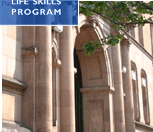
Before any of the Life Skills Program is delivered, the Life Skills Educator (a unique combination of counselor and teacher) engages in a number of group-forming activities, designed to create a unique environment for learning. The 10-15 individuals, who often start as strangers to each other, become, as a result of the process, members of a group. Ice breakers, a game to facilitate introductions and the remembering of names, an exercise which demonstrates the wholistic and life-long nature of career development, and a contracting session-- all help to create a new, positive group culture for learning.
Later, the Life Skills lessons begin. The Individuals remain seated with their chairs arranged in the shape of a horseshoe. The Life Skills Educator stands at the open end and walks inside the horseshoe as the lesson progresses and back and forth as needed to the video playback unit and a flipchart at the open end of the horseshoe.
Each of the ten units of the Adkins Life Skills Program: Career Development Series are organized according to the "Life Skills Structured Inquiry Learning Model" which includes a four-stage process. Each of the four stages are described below:
Stimulus stage
This stage includes a provocative five-minute video vignette that depicts, in an
emotionally arousing way, people confronting a difficult life situation.
Evocation stage
In the small group (not more than 15 members) the learners discuss and analyze the situation presented dramatically by the videotape. They share the feelings they have about similar problems and experiences.
Objective Inquiry stage
In this stage learners acquire new attitudes, knowledge and skills through a
variety of multi-media learning activities that include role-playing, modeling
videotapes, articles (written and also on CD's for people with literacy issues),
simulation activities, presentations, written forms, games and discussions.
The emphasis in this stage is on new learning and practice of new behaviors.
Application stage
During this last stage learners translate their new awareness, insight, feelings
and knowledge into actual behavior; they practice skills which are videotaped for the group to provide feedback and suggestions until real life mastery is achieved.
[ TOP ] |


